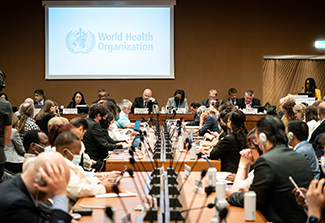World Health Assembly emphasizes strengthening global health workforce
July / August 2022 | Volume 21 Number 4
 Photo courtesy of WHO / Laurent CiprianiOne strategic roundtable at the 75th World Health Assembly discussed health emergency preparedness, response, and resilience
Photo courtesy of WHO / Laurent CiprianiOne strategic roundtable at the 75th World Health Assembly discussed health emergency preparedness, response, and resilience
The 75th World Health Assembly (WHA) addressed pressing global health challenges at their May 2022 meeting. These challenges include supporting the global health care workforce, acting against noncommunicable diseases (NCDs), strengthening health emergency preparedness, improving clinical trials, preparing urban areas for emergencies, preventing and controlling infection, and revitalizing responses to HIV, viral hepatitis and sexually transmitted infections. Delegates of the 194 member states of the WHA, the main decision-making body of the WHO, meet annually to agree on priorities and policies.
Supporting the health workforce
The WHA adopted the
Working for Health Action Plan (2022-2030) which recommends ways to optimize, build, and strengthen the global health care workforce. Measures taken since 2016 to address health workforce shortages have generated progress in many areas. For example, the global shortfall of workers is projected to drop from 18 to 10 million by 2030. Still, gains have been uneven across regions and the impact of the pandemic is still being felt in terms of health care system disruptions and added workload for medical and health staff.
The action plan highlights the importance of a strengthened workforce to benefit overall health and economic prosperity of all societies. The “Working for Health" model shows how progress can be made by optimizing existing healthcare systems to build more capacity and by strengthening the protection and performance of health care workers.
Actions on noncommunicable diseases
The world is falling short in reducing premature deaths from noncommunicable diseases (NCDs), and the Assembly approved several recommendations to address them. The WHO estimates that every minute, 28 lives between the ages of 30 and 70 are cut short by cardiovascular disease, cancer, diabetes, chronic respiratory diseases, or mental health conditions. Twenty-five of those deaths occur in LMICs.
Underinvestment in health systems to treat NCDs has been a major contributor to this issue. The UN Health Agency reports spending $0.84 per person per year could prevent and treat these diseases and conditions and so save nearly 7 million lives between now and 2030. Delegates approved a new implementation roadmap to accelerate action on NCDs that aims to help member states achieve the NCD-related targets in the United Nation's
Sustainable Development Goals (SDGs).
The Assembly also supported the creation of first-ever global targets for addressing diabetes, a global strategy on oral health, and new recommendations to prevent and manage obesity, among other key actions.
Emergency preparedness and response
The Working Group on Strengthening WHO Preparedness and Response to Health Emergencies (WGPR), first established in 2021, issued its final report, "Strengthening WHO preparedness for and response to health emergencies." The report proposes a variety of actions, including boosting manufacturing capacity for countermeasures (vaccines, therapeutics, diagnostics, essential supplies) and supporting regional manufacturing and diversification of production of countermeasures. The WGPR report also recommends developing processes for the transfer of technology and know-how to developing countries, strengthening whole genomic sequencing and analysis capability, and investing in health infrastructure workforce education, skills, and jobs. The intention is to engage local communities in health emergency prevention, preparedness, and response.
The WGPR acknowledged the importance of rapid and broad sharing of pathogens for effective disease surveillance but called attention to the sustainability of recently established initiatives, such as the
WHO BioHub and
WHO Hub for Pandemic and Epidemic Intelligence. The BioHub is a global system for sharing biological materials with epidemic or pandemic potential while the WHO Pandemic Hub focuses on detecting new events with pandemic potential, monitoring disease control measures for pandemic risk management, and leveraging innovations in data science for public health surveillance using a methodology called “pandemic and epidemic intelligence."
In conclusion, the WGPR proposed a working group on the International Health Regulations, which will help guide discussions on changes to protocols.
More Information
Updated August 11, 2022
To view Adobe PDF files,
download current, free accessible plug-ins from Adobe's website.
Related Global Health Research Topics